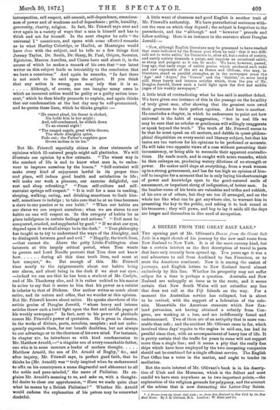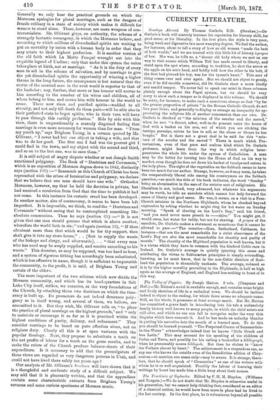A BREEZE FROM THE GREAT SALT LAKE.*
THE opening part of Mr. 011ivant's Breeze from the Great Salt Lake is a rapid sketch of his journey by the new mail route from New Zealand to New York. It is of the most cursory kind, but has a certain interest as the first description of travel in parts that have only recently been opened up. Ten years ago it was a real adventure to sail from Auckland to San Francisco, or to cross the American continent. Now it is among the easiest of journeys, and English letters to New Zealand travel almost exclusively by this line. Whether its prosperity may not suffer eclipse for a time is perhaps a question. Australia and New Zealand are unhappily at issue as to the route, and it seems certain that New South Wales will not subsidize any line that does not call at the Fiji Islands on the way. For a moment the Australian service has collapsed, but is about to be revived, with the support of a federation of the colo- nies. Meanwhile the American steamers which New Zea- land patronizes, not having obtained a subsidy from Con- gress, are working at a loss, and are indifferently found and undermanned. Two of them are of an antiquity that is more ven- erable than safe ; and the accident Mr. 011ivant came in for, which involved three days' repairs to the engine in mid-sea, has had its parallel since then, with an accompaniment of heavy loss of life. It is pretty certain that the traffic for years to come will not support more than a single line ; and it seems a pity that the really fine ships which have been employed by the two competing companies should not be combined for a single efficient service. The English Post Office has a voice in the matter, and ought to tender its mediation.
But the main interest of Mr. 011ivant's book is in his descrip- tion of Utah and the Mormons, which is the fullest and most candid we have seen anywhere as to two important points,—the explanation of the religious grounds for polygamy, and the account of the schism that is now distracting the Latter-Day Saints.
* A Breeze/rem the Great Salt Lake; or, from New Zealand to New York tly the New Mail Route. By J. E. 011iYant, M.A. London: W. Hunt and O.
Generally we only hear the practical grounds on which the Mormons apologize for plural marriages, such as the dangers of
female celibacy in a state of society which makes it difficult for
women to stand alone. These, however, are mere weapons of con- troveraialista. Mr. 011ivant gives, on authority, the scheme of a strangely fantastic cosmogony, in which the Mormons believe, and according to which millions of disembodied spirits are waiting to put on mortality by union with a human body in order that they may attain to their highest perfection. It is another version of the old faith which La Motto Fouque wrought out into the exquisite legend of Undine ; only that under this system the union takes place at birth, not at marriage. "As it is the duty of every an to aid in the scheme of salvation, and by marriage to give the yet disembodied spirits the opportunity of winning a higher throne in the long future, the consequence is but natural that the status of the married man in the next world is superior to that of the bachelor ; nay, further, that more or less honour will accrue to him according to the number of his wives and children, all of whom belong to him, and crown him with honour in the world to come. These now risen and purified spirits—wedded to all eternity, and not only till death do them part—will be able also in their perfected state to beget spirits, who in their turn will have to pass through this earthly probation." Side by aide with this view, there is unquestionably a scarcely disguised feeling that marriage is even more necessary for woman than for man. "From my youth up," says Brigham Young, in a sermon quoted by Mr. 011ivant, "I never had but one object in taking a wife, and that was to do her good. The first one I had was the poorest girl I could find in the town, and my object with the second and third, and so on to the last one, was to save them."
It is still subject of angry dispute whether or not Joseph Smith sanctioned polygamy. The Book of "Doctrines and Covenants," which is an exposition of Mormon dogma down to 1842, distinctly
says (section 109) :--" Inasmuch as this Church of Christ has been reproached with the crime of fornication and polygamy, we declare
that we believe that one man should have one wife." Orthodox Mormons, however, say that he held the doctrine in private, but had received a revelation from God that the time to publish it had not come. In this instance his esoteric creed has been developed.
In another matter, also of controversy, it seems to have been left imperfect. It is impossible, we think, to read the "Doctrines and Covenants" without seeing that he contemplated something like absolute communism. Thus he says (section 65) :—" It is not given that one man should possess that which is above another,
wherefore the world lieth in sin ;" and again (section 13), "If thou
obtaineat more than that which would be for thy support, thou shalt give it into my store-house," . . [first to supply the wants
of the bishops and clergy, and afterwards], . . "that every man
who has need may be amply supplied, and receive according to his wants." This doctrine, as may be supposed, was too hard to bear, and a system of rigorous tithing has accordingly been substituted, which is less offensive in name, though it is sufficient to impoverish the community, to the profit, it is said, of Brigham Young and certain of the elders.
The more important of the two schisms which now divide the Mormon community, and which has its head-quarters in Salt Lake City itself, strikes, we conceive, at the very foundations of the Church, by attacking those two doctrines on which the theo- cracy is built up. Its promoters do not indeed denounce poly- gamy as in itself wrong, and several of them, we believe, are committed to it. But they wish, Mr. 011ivant tells us, "to place the practice of plural marriage on the highest grounds," and "only to maintain or encourage it so far as it is practised within the highest conditions of purity, delicacy, and refinement." They consider marriage to be based on pure affection alone, not on religious duty. Clearly all this is at open variance with the popular theology. Next, they propose to substitute a tenth on the net profits of labour for a tenth on the gross results, and to make the rulers of the Church produce balance-sheets of their expenditure. Is it necessary to add that the promulgators of these views are regarded as very dangerous persons in Utah, and could not have lived there safely ten years ago ?
Our analysis of Mr. 011ivant's brochure will have shown that it is a thoughtful and moderate study of a difficult subject. We
may add that it is pleasantly written, and that the appendices contain some characteristic extracts from Brigham Young's sermons and some curious specimens of Mormon music.



































 Previous page
Previous page